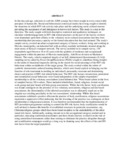| dc.description.abstract | In this day and age, solutions to curb the AIDS scourge have been sought in every
conceivable precipice of human life. Social and behavioural contextual studies have long
sought to identify the situations in which HIV risk activity take place and the underlying
socio-cultural reasons pervading the acceptance of and indulgence in known risk factors.
This study is a step in this direction.
The study sought with both descriptive statistical and qualitative techniques, to elucidate
whetherengagement in HIV risk related practices on the part of the factory workers were
dependant upon their affinity to the voluntary socio-cultural associations that they bore
membership,their pecuniary capacity or the formal education that they had attained.
The study's sample survey covered an urban occupational category of factory workers,
living and working in Mavoko municipality, an industrial hub with auxiliary roadside
settlements situated along the main artery of Kenya's transport network. The survey
included in its sample survey, 130 respondents aged between 18 to 45 years with the
qualities of residence and occupational engagement within the precinct of Mavoko
municipality, Athi River division in Machakos District. This study, which comprised
largely of an Self Administered Questionnaire (S.A.Q) sampling survey aided by Focus
GroupDiscussions (FGDs) sought to contribute (bring insight) to the realm of situational
inquiryby delving in the search for secial meanings of the HIV risk behaviour within
socialabodes of the target group.
The study worked within the rubric of symbolic interactionist cultural learning theories,
which were found explicit in bringing out the function of role enactment in molding an
individual's personality structure and determining choice and practice of HIV risk related
behaviour.
The HIV risk factqrs circumcision, premarital and extramarital sexual behaviour were
found independent of the sample respondents' membership to all the voluntary
associations [cited hitherto] that "Were found salient in the lives of sampled factory
Xll
workers. These included tribal/ethnic, burial, religious, formal social work group and
peer based self help group associations.
Whilst the risk factor, body scarification was found contingent on the presence of two
voluntary associations, religious and kin based associations, the directionality of the
inferred association was to ultimately stand out as the singular eye catching peculiarity in
the two associations' relationship. Whilst Kin based associations exhibited a positive
effecton the practice of body scarification, religious associations registered a suppressive
effect,indicating that the lowering of the practice was contingent on their membership to
religiousassociations.
It was therefore recommended that the implementation of HIV prevention programmes
seeking to control the HN risk factor, body scarification would be well advised to
harness the benefits of established structures in particular associations, say, Christian
religious groups which have been found receptive to the undesirability of the afore stated
risk factor. Additionally, making inroads in to the occupational category studied and in
particular, educating traditional practitioners and their clients [factory workers] on the
risk of using unsterilized instruments rather than seeking to eliminate the practice
altogether through anti-scarification campaigns would go a long way in shunting away
the effects of the said HN risk factor from the target population | en |

